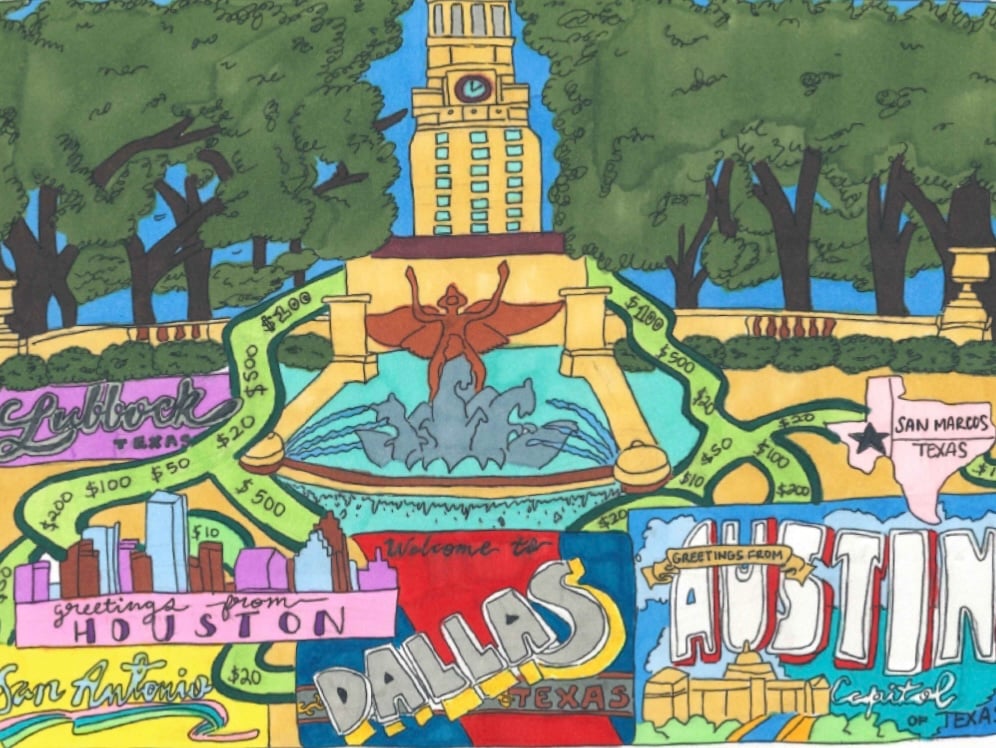Smerf looks at the ground while he speaks about his fractured family, his psychiatric disorders, his years as a drug user and dealer and his experiences seeing friends die. But when he starts talking about missionary Terry Cole, his eyes brighten, and he smiles.
“Terry is awesome,” said Smerf, who went by the name Steven Chevre until he started living on the Drag five years ago at 17. “He’s got such a big heart, and he’s helped me through some really tough times.”
The two met when Cole started volunteering with the Life Works drop-in on 23rd street. Cole didn’t know then that what began as an incidental volunteer job would eventually turn into a full-time missionary post to serve and reach out to the street youth on and around Guadalupe Street.
Cole was making six figures a year in the high tech industry at the time and went on mission trips and volunteered when he could. But eventually, he said he realized that God was calling him to minister to street youth full time. He spent a year working with social services program Life Works and an outreach program called Cream and Sugar and eventually created his own organization, called Street Youth Ministry, which he operates with support from Covenant Presbyterian Church.
“The college age group tends to believe the church is hypocritical, judgmental and no fun. That’s true for these kids and the students across the street at UT,” Cole said. “But the street kids are so spiritually hungry, and I try my best to show them the Word, reopening the doors of the church and showing them that Christianity can be relevant to their lives, because they’re quite sure that it isn’t.”
He conducts several weekly programs, including Bible studies, prayer times, outreach and food distribution and fellowship dinners. In the winter, he collects sleeping bags and jackets to distribute on freezing nights. When a street youth dies — in an accident, an overdose or a murder — Cole helps the youth organize memorial services in their honor.
Cole said he works with at least 25 street youth on the Drag during any given week, serving as a prayer leader, a sandwich maker, a grievance counselor and a friend. About 40 percent of his clients come from the foster care system, a third have a history of mental health problems, and about two-thirds have chemical substance abuse problems, he said. About 25 percent stay around Austin full time, while the rest are transient. They are largely 17-25 years old, and 25 percent are women.
Street youth have flocked to the UT-area for the past 50 years because the University area is the coolest place in town and they find the most people who look like them, he said. They are all spiritual and philosophical, but they don’t have to be Christian, God-seeking or even sober to attend his programs or receive services.
“I’m not religious, but I know Terry’s door is open to everyone,” said Erin Childers, an Austin native who has been on and off the streets and struggled with an addiction to speed, or amphetamines, for the last few years. “My spirituality is pretty simple. I believe that if you put 100 people in a dark gymnasium and light a candle, they’re not going to follow the same path to the candle, they just want to get to the light.”
Street youth and UT students often distrust each other because of stereotypes and, in some cases, earned prejudice on both sides, Childers said. While UT students often consider all street youth dangerous or hostile, some street kids see UT students as stuck up and inconsiderate, she said.
UT Police Department and Austin Police Department officers most regularly have to arrest or cite street youth for public intoxication, public urination, sleeping in public and aggressive panhandling — solicitations that are repeated, involve physical contact or occur within 25 feet of an ATM or bank entrance, said UTPD Officer Darrell Halstead.
“There aren’t regular incidents of violence by street youth against UT students, but we see a lot of other crimes, especially aggressive panhandling,” Halstead said. “We’re working with Life Works and some church groups to help find solutions that will make everyone safer and more comfortable.”
Some UT students are willing and excited to engage with the street youth, and Cole relies on the help of student and community volunteers for his programs. But in many ways, Cole runs a one-man show that he hopes to see continue to grow. His life is entirely different than it was three years ago, but he says the changes have brought him closer to God and spiritual fulfillment.
“Many people perceive the street kids as a problem, but if you get to know them they will be a blessing,” Cole said. “It doesn’t mean I love everything they do. I encourage them to change and to look at the harm they do to themselves and others, but first I love and accept them where they are.”

















